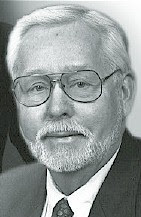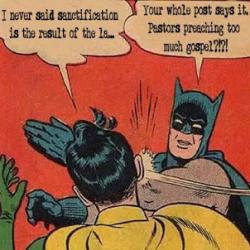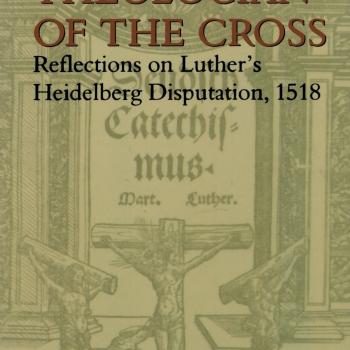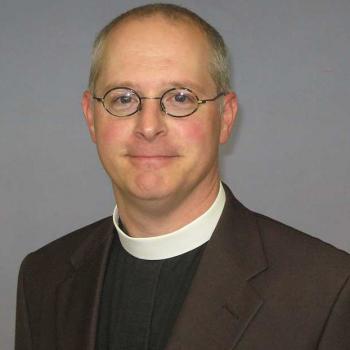I have been accused, through my previous posts on sanctification, of not properly representing Gerhard Forde. Well, this seems somewhat odd to me since none of my posts even mentioned Forde. However, this has caused me to go back and reread many of his works; I have decided to give an analyses of certain prominent ideas in Forde’s Theology.
Gerhard Forde was a highly influential ELCA theologian, who battled both against the encroaching liberalism of the ELCA and the inerrantist convictions of the LCMS. He coined the phrase “Radical Lutheran” and spent his career primarily writing on the doctrine of justification.
The essay I am taking a look at is titled “Whatever Happened to God: God Not Preached” The reason I am discussing this particular essay is that it expounds upon one of Forde’s central themes, which he discusses in greater detail in his work Theology is for Proclamation. This essay can be found in the book The Preached God: Proclamation in Word and Sacrament.
Forde’s primary contention, in both this essay and the above-mentioned book, is that there is a distinction between systematic theology and proclamation. He asks, “whatever happened to God? God has fallen victim to explanations, to theology itself–theology about God-not-preached.” (38)He critiques various theologies which attempt to explain God away, answer the problem of suffering by altering the doctrine of God. Forde is spot on in his critique of the theologies of Moltmann, Pannenberg, and others who attempt to argue that divinity suffers as a philosophical explanation to the problem of suffering. Weakening and emasculating God do not solve such issues, and ultimately are not in accord with the Biblical witness or the catholic tradition. Not all theological and philosophical questions need to be answered; what is needed is proclamation of the cross of Christ.
What concerns me in this essay, however, is that Forde never explains exactly what constitutes systematic theology, or what constitutes a theology that speaks “about God” rather than preaching God. Forde does acknowledge that systematic theology can be a good thing and helpful, as he equates his own writing here with systematic theology. He writes that “the purpose of systematic theology is not to subvert proclamation but to drive to effective proclamation.” (42) My question is: Is systematic theology purely that which speaks about proclamation? Or is the Lutheran scholastic approach to theology also considered a valid method of theologizing? Because of the way that he speaks negatively about atonement formulations in other work, I worry that he is rejecting the entire Lutheran dogmatic tradition. I want to know how far this goes.
Forde is right that there is a distinction between God proclaimed, and God explained. There certainly is a difference between me giving a sermon on the communicatio idiomatum and telling my congregation “Your sins are forgiven!” Preaching should not be abstract theologizing; it should always be connected to the people and focused on the cross. However, Forde divorces these two methods of speech beyond what I think is viable. In Forde’s words, “Proclamation means finally to stop talking about it, and actually to give it. It means not talking about God, but speaking for God.” (43) The question I have is: Can we really proclaim something directly without simultaneously speaking about something? When I proclaim to my congregation “Your sins are forgiven” there is implied objective content behind what I am saying. Behind the proclamation is the teaching that Christ is God and man, died on the cross for sins, and rose from the dead.
I fear that Forde, taking a cue from Barth, privileges act over being. He constantly speaks of of Christology in these terms: “What happened to God is Jesus.” (48) Talk of action, of doing, takes precedence over talk of being, or of something that is a metaphysical reality. Forde writes, “Since theology has tried to penetrate the mask of the hidden God by peddling some general metaphysical ‘truths’, faith becomes not trust in the proclamation but strives toward sight, to become a kind of gnosis.” (53) I wonder if this includes typical discussions of the attributes of God. If this is the case, how are the ancient metaphysical explanations of the Trinity valid? Or are they? Forde’s contention is not in accord with the catholic tradition, which has typically adopted the Greek conception that being has priority over act.
There are a couple curious statements that temper what Forde is suggesting. He states for example that “there can be didactic preaching, there can be preaching as ethical discourse” (45) which he calls “legitimate forms of discourse in the church.” (45) This demonstrates that there can be some type of theologizing, and even ethical instruction from the pulpit. He even says that, “Not every sermon, certainly not even the entire sermon, will or must be proclamation. But it is what the theologian, the preacher, must eventually be aiming at.” (45) It is curious and surprising that Forde would approve of preaching a sermon without proclamation.
In this essay, Forde makes some valid points as to the necessity of proclaiming the forgiveness of sins; however, he oversimplifies the distinction between giving an explanation and proclaiming. One cannot happen without the other. He also is unclear about what he views as “systematic theology” and exactly what type of theologizing he is rejecting. I fear that he is rejecting much of the catholic and Lutheran tradition through his privileging act over being, declaratory speaking over objective metaphysical content.










